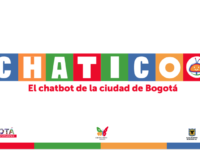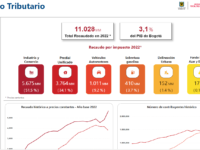The project proposes a system for extracting and analysing information from the medical records of breast cancer patients, using artificial intelligence. This would support research, personalised medicine and health decision-making, benefiting clinicians and regional authorities. This provides an automated alternative to accelerate translational research, promote personalised medicine and improve the efficiency of health services.
Case Study Library
Where innovations are collected and shared to disseminate and replicate good ideas

Innovations:
0
This website, as well as any data and map included herein, are without prejudice to the status of or sovereignty over any territory, to the delimitation of international frontiers and boundaries and to the name of any territory, city or area.
In order to promote open government in Bogotá, strengthen trust, facilitate advocacy and digital democracy, improve the experience of procedures and services and the relationship between citizens and the District Administration, Chatico, Bogotá's virtual agent, was born. Chatico is a tool available on the Web and Whatsapp that enables citizen participation and identifies, unifies, centralises and rationalises procedures, services and information of interest to citizens.
Marea Digital allows citizens to report local problems to the government, as well as local initiatives that are working for the communities’ well-being. Contrary to similar kind of initiatives, it’s innovative because it uses tech to allow the citizens to aggregate data about their communities’ problems, but also includes an offline strategy for the local government to design solutions with the citizens to solve the problems reported, fostering dialogue and collaboration to solve…
Engativa's Town Hall developed “miengativapp”, a web-type application that was implemented to support process management. It was implemented because of the pandemic as a tool to manage the office remotely. It benefits around 300 professionals in the development of their work, creating agility, organization, and transparency in information handling, paired with a unique approach to public administration in the city at a local level.
FiscalData is an innovative tool created for the analysis of Bogota, Colombia's fiscal situation. It promotes transparency around local public sector finances. FiscalData seeks to benefit the citizens of Bogotá by serving as a mechanism for participation on fiscal issues between civil society and the public and private sectors.
This initiative was created to accelerate the decarbonisation process of the energy and transport sectors in Colombia and work on the training and technicalization process for multiple sectors of society involved. A total process of decarbonisation of the energy and transport sectors cannot be possible if working in a single line. Carbon Neutral Pathway (Camino Hacía Carbono Neutral - CHCN) works with a broad range of stakeholders, including public officials, journalists, academics,…
MiLAB - Govtech and Public Impact Laboratory, aims to contribute on the digital transformation acceleration of the public sector, by connecting it, through collaboration and open innovation strategies, with start-ups and SMEs that uses emergent technologies and innovative methodologies. MiLAB successfully specialized its activity within the public impact ecosystem, attending the high demand and global tendency of rely on digital innovator among the Government.
MedeINN arose from the need to innovate in the government sector, in a city that had been developing its innovation capabilities in all other sectors. For this reason, and under Innovative State premise, we seek to connect the Mayor's Office of Medellín´s challenges with entrepreneurs and researchers capacities. This has been achieved after a redesign of a Public Procurement for Innovation methodology, which enables Open Innovation in the government sector.
For 80 years we have been working for the well-being of people in disadvantaged areas, but they have rarely been asked how they expect a suitable and valuable public space to be. With our project, we create public spaces that, apart from roads, pavements and quality access, promote safety, comfort, life and the local factor of each territory. We innovate in the way in which the inhabitants of a sector transform their environment, beyond the rootless perception of the "experts".
Council to the street is an innovative strategy to strengthen democracy through citizen participation. It is a strategy that brings the city's institutions out to listen and respond to citizens in public spaces. Citizens identify their priority needs and requirements and in a public session the Council and the Mayor's Office respond to them. The citizens should be the overseers of the commitments reached in the space. During the process the citizenry is strengthened and accompanied.






